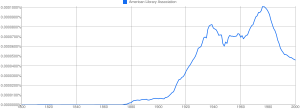Thursday Threads: Kindle Ebook Lending, Google Ngram Viewer, Collaborative Open Source Development
This week brought news of the Kindle-based e-book lending program through Overdrive, and Peter Brantley has an opinion piece on what this means for Amazon, publishers, and even libraries. From the other e-book powerhouse -- Google -- is a TED talk presentation about the Google Books ngram Viewer. Finally, there is a view of one of the benefits of the open source software model with an announcement that six libraries are funding development to meet their needs.
Feel free to send this newsletter to others you think might be interested in the topics. If you are not already subscribed to DLTJ's Thursday Threads, visit the sign-up page. If you would like a more raw and immediate version of these types of stories, follow me on Mastodon where I post the bookmarks I save. Comments and tips, as always, are welcome.
Lending E-Books is about B-2-C
There’s one other thing about the entry of Amazon into e-book lending that I find quixotic. Libraries have been wondering just how much e-book lending contributes to e-book sales, in order to help justify business models that accommodate library partnerships. Guess who has that data: the organization that does both selling and lending. That would be Amazon.
- Lending E-Books is about B-2-C, Peter Brantley, Publishers Weekly PWxyz blog
Peter Brantley, Director of the Bookserver Project at the Internet Archive, writes this short piece about the differences on how Amazon and publishers view the electronic book lending program. "Every Kindle e-book borrowed serves to inform Amazon’s sales and marketing departments and brings consumers to its website" versus "publishers see e-book lending from the perspective of lost unit sales." The pull quote above puts this in a library perspective.
What we learned from 5 million books

Have you played with Google Labs' Ngram Viewer? It's an addicting tool that lets you search for words and ideas in a database of 5 million books from across centuries. Erez Lieberman Aiden and Jean-Baptiste Michel show us how it works, and a few of the surprising things we can learn from 500 billion words.
- What we learned from 5 million books, Jean-Baptiste Michel and Erez Lieberman Aiden, TED.com
Two visiting faculty at Google describes the origins and example findings from the ngram viewer of the Google Books project. With the ngram viewer, it is possible to look and compare the frequency of words digitized in books as part of the Google Books project. For example, one can look up the frequency of the phrase "American Library Association" (a 3-gram) in English language books from 1800 to 2000. This is the kind of digital introspection into the corpus of published materials that is being highlighted in the Digital Public Library of America proposals as a way to enhance patron access to information in library collections.
Six libraries partner to bring customizable print slips to Koha
ByWater Solutions, an open source community supporter and official Koha support company announced today that six of their library partners are joining forces to bring customizable print slips to the Koha ILS.... ByWater Solutions will be partnering with Catalyst IT, of Wellington NZ on this development, making it a multi-state, multi-country collaborative effort.
- Six libraries partner to bring customizable print slips to Koha, Library Technology Guides
It isn't typical that I post company press releases here on DLTJ Thursday Threads, but I think this one is worth special note. Specifically, it is useful to point out this mode of supporting open source software development. Six libraries have come together to fund the development of functionality that they need, and the output will ultimately be contributed back to the open source project for the benefit of all. The open source software development model enables this kind of "rising tide lifts all boats" possibility.